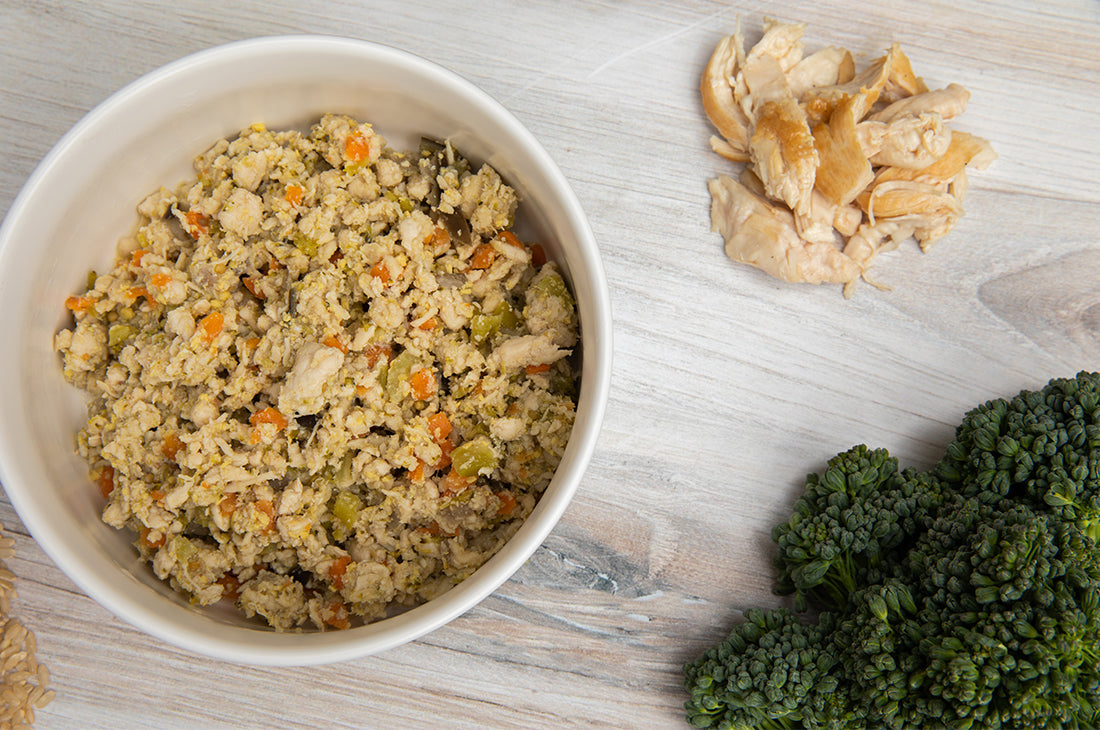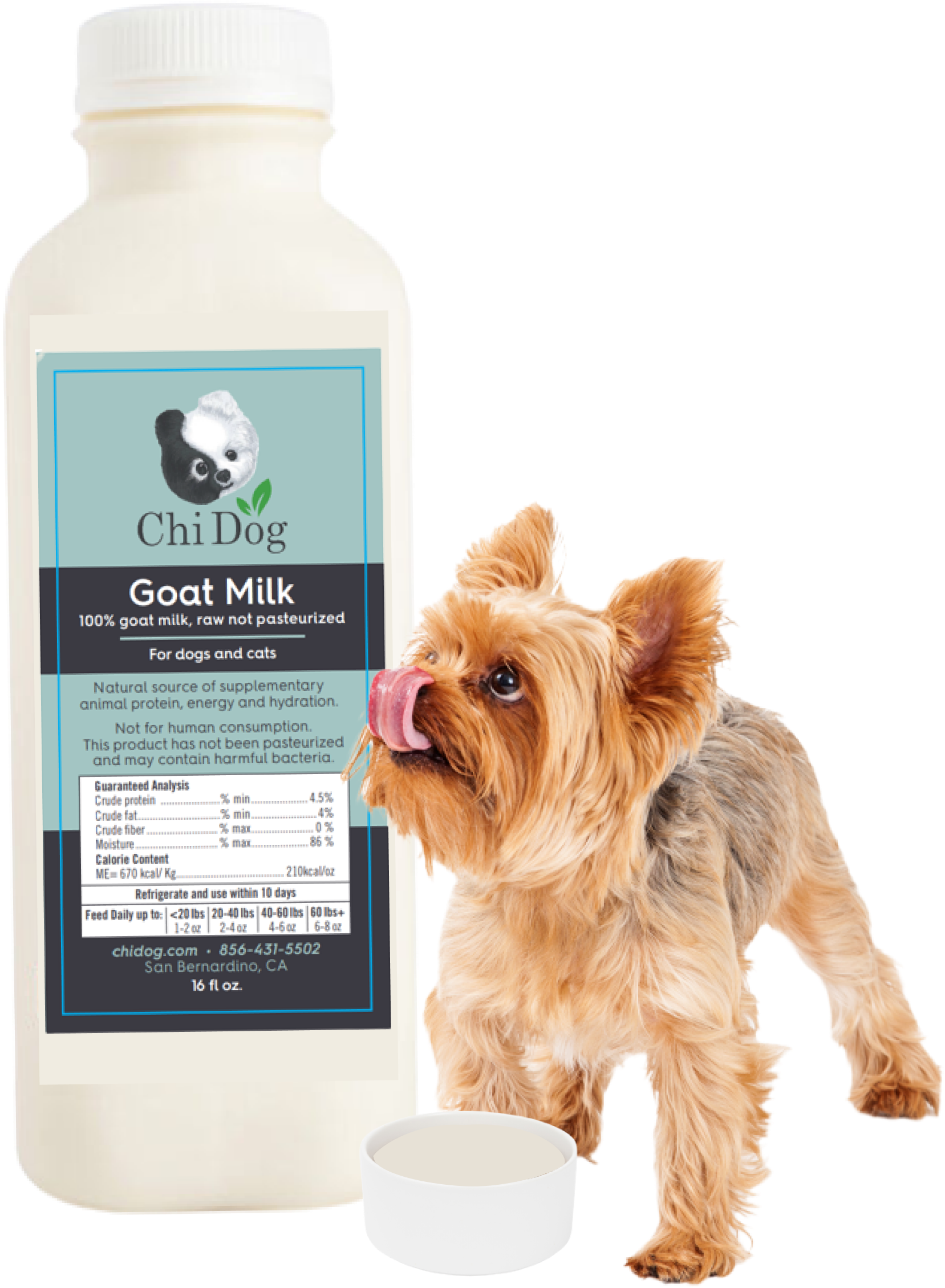
Best Dog Food For Sensitive Stomach: Vet Advice on What to Feed a Dog With Sensitive Stomach


Watching your beloved furry friend squirm in discomfort or refuse to eat is heart-wrenching for any pet parent. The frequent trips to the vet, the mounting bills, the helplessness when yet another dog food brand fails to bring relief - yes, we know it's agonizing.
But what if there was a simple, vet-approved solution that could not only ease your dog's sensitive stomach but also pave the way for a healthier, happier life? That solution exists, and it's called the Wood Diet - the best dog food for sensitive stomach.
We’ll walk you through what to feed a dog with sensitive stomach in this guide and illustrate the profound difference our holistic diets can make in your pet’s health and happiness. At Chi Dog, we combine the wisdom of Traditional Chinese Medicine (TCM) with modern veterinary advice to bring you the most effective solutions for your dog's digestive woes.
Beyond unveiling the best sensitive stomach dog food, we’ll offer more tips to provide rapid and lasting relief for your puppy or older pet. First, let’s set the stage and provide some context on sensitive stomach problems in dogs.

A Brief Overview of Sensitive Stomach in Dogs: Symptoms, Causes, and More
Having a dog with a sensitive stomach can be a huge source of stress. But understanding this condition is the first step towards providing your pet with the inputs they need to feel better fast.
Wouldn’t it be nice to see your canine companion wag their tail in genuine happiness, rather than tuck it in distress? So let's demystify this common, yet often misunderstood, condition.
Recognizing the Symptoms of a Sensitive Stomach in Dogs
Is your dog more enthusiastic about playing fetch than finishing their food? Or perhaps they've been showing signs of discomfort like whining, pacing, or even vomiting shortly after meals?
A sensitive stomach often manifests in myriad ways. Some key symptoms to watch out for include:
- Vomiting: Occasional or right after meals
- Diarrhea or Loose Stools: Often with undigested food
- Excessive Gas: More than just the usual doggy flatulence
- Loss of Appetite: Refusing food or eating less than usual
- Lethargy: Low energy levels, especially after meals
- Gurgling Noises: Audible sounds from the stomach or abdomen
- Abdominal Discomfort: Indicated by pacing, whining, or attempting to hide
Common Causes and Underlying Issues
Contrary to popular belief, a sensitive stomach is often more than just an isolated gastrointestinal issue. It's a reflection of overall well-being.
According to Traditional Chinese Medicine (TCM), the stomach is intrinsically linked with the spleen, and together they form the foundation of your dog's digestive and metabolic health. The following are some of the most common causes:
- Poor-Quality Food: Filled with artificial preservatives and additives
- Food Allergies or Intolerances: Such as lactose or grain
- Parasitic Infections: Like Giardia or worms
- Stress or Anxiety: Yes, emotional well-being impacts physical health
- Rapid Diet Changes: Switching foods without a transition period
- Chronic Conditions: Such as Inflammatory Bowel Disease (IBD) or pancreatitis
- Environmental Factors: Changes in weather or living conditions
When to Consult a Veterinarian: Red Flags and Warning Signs
A sensitive stomach alone isn’t huge cause for concern - although it must be addressed. That being said, the symptoms of a sensitive stomach often mirror more serious underlying conditions. How can you differentiate between the two, and when is a vet visit necessary?
While mild symptoms can often be managed with diet changes and natural remedies, there are red flags that necessitate immediate medical attention. Take your dog to the vet if you notice:
- Blood in Vomit or Stool: Could indicate a severe condition
- Unexplained Weight Loss: Over a short period
- Prolonged Diarrhea or Vomiting: Lasting more than a day
- Collapsing or Fainting: Sign of an emergency
- Severe Pain: Marked by excessive vocalization or hiding
By understanding these fundamentals, you're not just being a vigilant pet parent; you're also laying the foundation for the next step - finding the ultimate dietary solution for your dog's sensitive stomach.
Before we unveil the best sensitive stomach dog food and explain what to feed a dog with sensitive stomach, let’s talk about the role of diet in the first place.
How the Best Dog Food For Sensitive Stomach Can Help

If you've ever had digestive issues, you know how utterly disruptive they can be to your life. The same goes for your four-legged friend.
Just as you wouldn't ease your upset stomach with greasy fast food, your dog requires a specific kind of nourishment to soothe their sensitive gut.
Thankfully, the right diet can transform your dog's life, reducing discomfort and increasing overall vitality. Here’s how traditional Chinese medicine looks at the link between dog food and sensitive stomach.
The Role of Diet in Digestive Health: The TCM Perspective
Traditional Chinese Medicine (TCM) is more than an ancient practice. It's a holistic approach to health that has been honed over thousands of years. In the TCM view, the gut is not just a digestive organ but the center of your dog's overall well-being.
The stomach, tied closely to the spleen, is responsible for converting food into Qi (life energy) and blood. When this system is disrupted, your dog's Qi becomes unbalanced, causing a myriad of symptoms that may include digestive disturbances.
According to TCM, various foods have properties that can either support or undermine digestive health. Foods are categorized by their thermal nature (cooling, neutral, and warming) and their effect on Qi.
For dogs with sensitive stomachs, a balanced diet targeting their specific Qi imbalances can mean the difference between a night spent in discomfort and one of peaceful sleep.
Essential Nutrients for Dogs with Sensitive Stomachs
The pathway to healing begins with understanding what nutrients are essential for a dog with a sensitive stomach. Here’s a rundown:
- Proteins: Opt for easily digestible, high-quality protein sources like fish or lean poultry.
- Fibers: Soluble fiber, found in oats and sweet potatoes, helps absorb excess water in the intestine, improving stool quality.
- Fats: Omega-3 and Omega-6 fatty acids can help soothe the intestinal lining.
- Vitamins and Minerals: Essential for immune system function and metabolic activities. Look for food enriched with vitamins like B12 and minerals like zinc.
Our Wood Diet, which we believe to be the best dog food for sensitive stomach, is rich in all these essential nutrients, and it even goes a step further by aligning these ingredients with TCM principles. This ensures not just symptom relief but a holistic healing process.
But it’s not just about nutrients in looking for the best sensitive stomach dog food. Let’s talk about the importance of quality ingredients.
Why Ingredients Matter: The Pros and Cons of Common Ingredients
You can't solve a puzzle with the wrong pieces, and you can't heal a sensitive stomach with unsuitable ingredients. Unfortunately, many commercial dog foods are full of fillers, preservatives, and low-quality ingredients that can exacerbate gastrointestinal issues.
- Fillers like Corn and Soy: Often used as cheap fillers to bulk up dog food, corn and soy provide little nutritional value. They can be difficult for some dogs to digest and may exacerbate gastrointestinal issues. In the lens of TCM, these grains can contribute to an imbalance of "Qi," affecting digestive health.
- Artificial Colors and Flavors: These are added to make food more visually and gustatorily appealing but offer zero nutritional benefits. They can lead to allergic reactions, which may manifest as gastrointestinal symptoms, further aggravating a sensitive stomach.
- By-products: These are often low-quality protein sources that include parts of the animal that are less nutritious. They can be harder to digest and lack the full profile of essential amino acids needed for optimal health. From a TCM perspective, the energy from these sources is not as nourishing or balanced.
You owe it to your dog to offer them a life free from the shackles of digestive discomfort. With the Wood Diet, you're not just feeding them, you're nourishing their soul, harmonizing their Qi, and giving them the life they truly deserve.
That being said, let’s introduce you to the best sensitive stomach dog food below - available right here at Chi Dog!
So, What Food is Best for a Dog With a Sensitive Stomach? Our Advice on What to Feed a Dog With Sensitive Stomach
Navigating the aisles of your local pet store can be overwhelming. With so many brands promising to cure your dog's digestive woes, how do you know which one to trust?
The truth is, you won’t find the best dog food for sensitive stomach there. It’s just a few clicks away here at Chi Dog. Allow us to guide you towards a holistic solution that not only addresses the symptoms but the root cause of sensitive stomachs in dogs.
Introducing Chi Dog’s Holistic Dog Food
We're not just another dog food brand. We're a lifestyle choice aimed at aligning your dog's nutrition with the ancient wisdom of Traditional Chinese Medicine (TCM).
At Chi Dog, we understand that each dog is a unique being with individual health needs. That's why each of our holistic dog diet plans is tailored to bring harmony and balance to your pet's life force or “Chi”.
Our kitchen is USDA Certified, and our recipes are formulated to meet the rigorous nutritional levels established by the AAFCO. We believe in transparency, quality, and the well-being of your furry friend. So, what food is best for a dog with sensitive stomach at Chi Dog?
The Wood Diet: A Vet-Approved Solution for Sensitive Stomach
If your dog suffers from a sensitive stomach, liver issues, or even seizures, the Wood Diet is the best sensitive stomach dog food. It’s an exquisite balance of ingredients designed to alleviate these challenges. This vet-approved solution contains:
- Chicken: A lean protein that is easy to digest and less likely to cause allergies.
- Chicken Eggs: A superb source of protein and choline, which supports liver function.
- Brown Rice: Provides necessary fiber for digestive health without causing irritation.
- Chinese Eggplant, Carrots, Broccoli: These carefully selected vegetables offer a broad range of vitamins and are cooling in nature, which is beneficial for dogs with sensitive stomachs.
This dietary approach addresses not just the stomach but the whole body. It supports the liver, an organ strongly associated with digestion in both TCM and modern medicine.
High in protein and moderate in fats, the Wood Diet aligns with AAFCO guidelines for all life stages of a dog. At just $6/day and meals delivered right to your door, the Wood Diet is not just nutritionally superior but also convenient and cost-effective. That being said, here are some tips on introducing your pet to the best dog food for sensitive stomach.
Tips for Feeding Your Pet the Best Sensitive Stomach Dog Food
Knowing what to feed a dog with sensitive stomach is one thing - transitioning them to their new diet can be a challenge in its own right!
Fortunately, we’ve helped countless pet parents move their dog over to the best sensitive stomach dog food - here are some tips on gradually easing them into the new diet:
- Gradual Transition: Switch to the Wood Diet gradually over a week to allow your dog's digestive system to adjust.
- Consult Your Veterinarian: Always consult your vet before making a significant dietary change, especially for dogs with existing health conditions.
- Monitor and Adjust: Observe your dog's bowel habits, skin, and overall demeanor to ensure the diet is beneficial.
- Keep Hydrated: Always provide fresh water, especially when switching to a more protein-rich diet.
There you have it - the best dog food for sensitive stomach. Now that you know what to feed a dog with sensitive stomach, let’s go over a few other ways you can help you pup find rapid, lasting relief.
More Advice on Treating Sensitive Stomach in Dogs Beyond Diet

Diet is a critical component for managing sensitive stomachs, but it's just one part of a more comprehensive approach to canine health. Here are some additional strategies that can go hand-in-hand with our Wood Diet to fully address your dog's digestive discomfort.
Hydration: An Often Overlooked Aspect in Managing Sensitive Stomachs
As we briefly mentioned earlier, water plays an essential role in digestive health. It helps in the absorption of nutrients and the effective functioning of enzymes.
Yet, many dog owners overlook this simple but crucial component. Always ensure your dog has access to fresh, clean water.
When switching to a new diet like the Wood Diet, which is richer in protein, maintaining adequate hydration becomes even more vital to counterbalance the increased demand on your dog's kidneys and digestion.
Probiotics and Prebiotics: Do They Help?
The gut is a complex ecosystem of beneficial bacteria that aids in digestion and immune function. Probiotics introduce beneficial bacteria into the gut, while prebiotics serve as food for these bacteria. Both can be beneficial in regulating your dog's digestive system.
Consult your vet for the right type and dosage, especially when complementing the Wood Diet. They can synergize well with our specially formulated meals, enhancing the benefits manifold.
Herbal Therapies for Supporting Digestive Health
In Traditional Chinese Medicine (TCM), herbal remedies often complement dietary adjustments. Ingredients like ginger, peppermint, and chamomile have been used for centuries to soothe gastrointestinal discomfort.
However, consult your vet or a TCM specialist before incorporating any new herbs into your dog's regimen. These can potentially interact with other medications your pet might be on.
Acupuncture and Other TCM Methods to Complement the Wood Diet
While dietary changes like the Wood Diet focus on nourishing the internal organs, TCM methods like acupuncture aim to balance the flow of Chi (energy) through the body.
Acupuncture has shown promising results in treating digestive issues, including sensitive stomachs, by realigning the body's natural energy channels.
This ancient method can serve as an excellent complement to our Wood Diet, making it a holistic approach to managing your dog's digestive health.
As you can see, treating a dog with a sensitive stomach is more than just switching dog food. From hydration to probiotics, and even acupuncture, there's a holistic world of support out there for your dog's digestive health. And at the heart of it all? Chi Dog’s Wood Diet.
So, get the best dog food for sensitive stomach today and see what a difference it can make in your pet’s happiness and vitality. At this point, it’s time we wrapped up this guide on what to feed a dog with sensitive stomach.
Wrapping Up Our Guide on What to Feed a Dog With Sensitive Stomach
Finding the best sensitive stomach dog food can be overwhelming. From recognizing symptoms and understanding the causes to choosing the right food and complementary therapies - each step plays a crucial role.
The most significant of these is, of course, diet. A targeted, high-quality diet can be a game-changer for dogs with sensitive stomachs, offering not just relief but long-term health benefits.
Here at Chi Dog, we understand this intimately, which is why we crafted our Wood Diet - meticulously formulated by veterinarians, rooted in Traditional Chinese Medicine, and backed by scientific research. It's not just food, it's a holistic solution.
You can learn more about what to feed dogs with ibd, the best dog food for anxiety, the best food for overweight dogs, the best food for dogs with skin allergies, and the best dog cancer diet recipe in our blog. We have diets to fit all your dog’s changing needs.
Make the change today and watch your dog's health transform, one delicious, nutritious meal at a time. Experience the Chi Dog difference - your pet will thank you the best way they know how with love and affection.
_________________________________________________________________________
About the author
Dr. Susan Bohrer has been a practicing veterinarian for 15 years teaching home cooking techniques to clients. Dr. Bohrer is Certified in Traditional Chinese Veterinary Medicine’s Herbal Therapy, Acupuncture and Food Therapy.
Download PDF here



